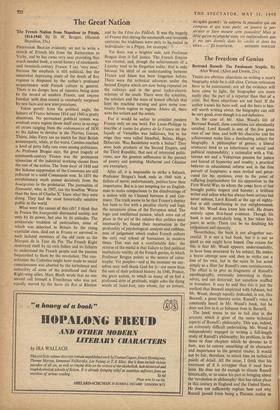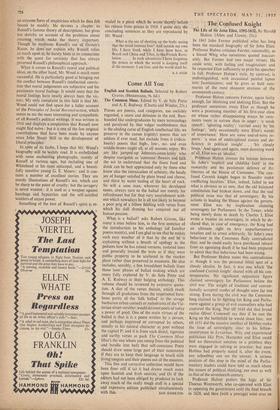The Freedom of Genius
Bertrand Russell: The Passionate Sceptic. By Alan Wood. (Allen and Unwin, 2 IS.) THERE are obvious objections to writing a man's biography while he is still alive. Certain reticences have to be maintained; not all the evidence will have come to light; the biographer can more easily play the part of a reporter than that of a critic. But these objections are not fatal. If the author knows his hero well, and the hero is him- self worth writing about, the biography can still be very good, even though it is not definitive.
In the case of Mr. Alan Wood's life of Bertrand Russell, these conditions are abundantly satisfied. Lord Russell is one of the few great men of our time, and both his character and his achievement make him a fascinating subject for biography. A philosopher of genius; a liberal aristocrat bred to an inheritance of social and political responsibility; a rationalist with a Vol- tairean wit and a Voltairean passion for justice and hatred of hypocrisy and cruelty; a practical believer in educational reform and in the free pursuit of happiness; a man reviled and perse- cuted for his opinions, even to the point of suffering imprisonment for his opposition to the First World War, to whom the years have at last brought public respect and honour; a brilliant writer and talker who has always been serious but never solemn, Lord Russell at the age of eighty- five is still contributing to our enlightenment. And Mr. Wood does know him well. He draws entirely upon first-hand evidence. Though his book is not particularly long, it has taken him years to write. There can be no doubting his enthusiasm and sincerity.
Nevertheless, the book is not altogether suc- cessful. It is not a bad book, but it is not so good as one might have hoped. One reason for this is that Mr. Wood appears, understandably, to have been overawed by his subject. He makes a brave attempt now and then to strike out a line of his own, but in the main he has acted simply as a filter for Russell's own reminiscences. The effect is to give us fragments of Russell's autobiography, extremely interesting in them- selves, and not distorted; but somehow muffled in transition. It may be said that this is just the method that Boswell employed with Johnson, but Mr. Wood, though equally dedicated, is not, like Boswell, a great literary artist. Russell's voice is constantly heard in Mr. Wood's book, but he does not live in it as Johnson lives in Boswell.
The book seems to me to fail also in the account which it gives of the more technical aspects of Russell's philosophy. This was, indeed, an extremely difficult undertaking. Mr. Wood is independently engaged in writing a full-length study of Russell's philosophy; his problem, in the three or four chapters which he devotes to it here, was to convey something of its character and importance to the general reader. It would not be fair, therefore, to attack him on technical points of detail. All the same, I think that his treatment of it is scrappier than it need have been. He does not do enough to situate Russell historically, or to assess his part in bringing about the 'revolution in philosophy' that has taken place in this century in England and the United States. He does not sufficiently explain how and why Russell passed from being a Platonic realist to an extreme form of empiricism which he then felt bound to modify. He devotes a chapter to Russell's famous theory of descriptions, but gives too sketchy an account of the problems about meaning, which make the theory important. Though he mentions Russell's use of Occam's Razor, he does not explain why Russell relies so much upon it; he barely hints at its connection with the quest for certainty that has always governed Russell's philosophical approach. - When it comes to Russell's moral and political ideas, on the other hand, Mr. Wood is much more successful. He is particularly good at bringing out the conflict between Russell's intellectual convic- tion that moral judgements are subjective and his passionate moral feelings. It would seem that the moral feelings have nearly always been the vic- tors. My only complaint in this field is that Mr. Wood could not find space for a fuller account of the Principles of Social Reconstruction, which seems to me the most interesting and sympathetic of all Russell's political writings. It was written in 1916 and displays a utopianism that Russell now might find naive : but it is one of the few original contributions that have been made by anyone since John Stuart Mill to the development of liberal principles.
In spite of its faults, I hope that Mr. Wood's biography will be widely read. It is embellished with some enchanting photographs, mainly of Russell at various ages, but including one of Whitehead at his most episcopal, and a beauti- fully sensitive young G. E. Moore : and it .con- tains a number of excellent stories. They are mostly illustrations of Russell's wit, which can be sharp to the point of cruelty; but the savagery is never wanton : it is used as a weapon against humbugs and hypocrites and the self-satisfied wielders of unjust power.
Something of the best of Russell's spirit is re-
vealed in a piece which he wrote'shortly before his release from prison in 1918. I quote only the concluding sentences as they are reproduced by Mr. Wood :
What is the use of shutting up the body, seeing that the mind remains free? And outside my own life, I have lived, while I have been here, in brazil and China and Tibet, in the French Revo- lution. . . . In such adventures I have forgotten the prison in which the world is keeping itself at the moment: I am free, and the world shall be.
A. J. AYER











































 Previous page
Previous page